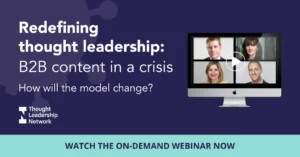Why distinctiveness is key for brands navigating “Corona” content overload
Now more than ever, it’s imperative for B2B brands to be visible. Battening down the hatches and disappearing from view is not an option. The need to remain relevant is equally important. We’ve all witnessed content and social media posts recently that seem off message or jar with the current context. These poorly timed campaigns seem almost like relics of a bygone age and are unlikely to gain traction with audiences seeking insight into dealing with the current crisis.
To avoid off-key content, tuning into the situation and speaking directly to the challenges your audience is facing is crucial. But beware: there is risk associated with being relevant. And that risk is your content and messages sounding just the same as everyone else’s.
How much “thought leadership” have you seen in recent weeks on how to work remotely; how to get the most out of collaborative technology; or how to adapt your management model for a remote workforce? So much B2B content is saying very similar things right now, making it harder than ever to stand out.
Even in normal times, it’s difficult for brands to avoid clustering around similar topics. Pre-crisis, digital transformation, sustainability and were the favourites. But fast-forward to today, that clustering becomes even more extreme as almost every B2B brand wants to write about just one, single topic. As a result, there is a significant risk of sounding generic, appearing to simply repeat what others have said. Worse still, this universal insight risks delivering clichéd advice and jumping on a bandwagon.
So how do you tread the fine line between tuning into the context and sounding the same as everyone else? Here are my thoughts:
Find your ideal lens
Every business has a unique perspective, even in sectors that may appear crowded with competitors. Look beyond generic advice to provide perspectives that only your company can give. This doesn’t mean talking about products and services, but drawing on the experience, knowledge and stories only your business has to offer. Find the thought leaders in your company who have truly distinctive viewpoints and use them as the platform for your content. Think about what your brand represents and what your company wants to be famous for, then make sure this comes through loud and clear in your content.
Maintain a short-term and long-term focus
The current situation requires marketing teams to operate a multi-speed content model. They must provide content now that gives much-needed advice on how to manage a crisis situation; but they must also look beyond the depths of the crisis to a time when companies start to see green shoots of recovery and there is more appetite for optimism. Even if the timing is currently uncertain, make sure you have content ready for when this time comes.
Avoid the clichés
Yes, we know we’re in a crisis and we’re living in unprecedented times. Introducing your content with these platitudes can quickly switch audiences off. It’s important to avoid stating the obvious. Instead quickly get to the core of your messaging and show how you intend to stake your claim on the topic.
Think one step ahead
Don’t follow the herd. If there are already dozens of articles out there on a topic, don’t be tempted to add to the clutter. Bear in mind that your audience’s priorities will shift as we transition through the three main stages of this crisis: readjustment to new reality; adaptation and the shift or refocusing of business strategies; and re-entry as some semblance of reality starts to return and companies can finally look ahead. Anticipate your audience’s needs at each of these stages and be proactive rather than reactive.
Be agile
In such a fast-moving situation, your content needs to be highly responsive. When it comes to ideation and production, processes that may have previously taken months must be compressed into a matter of weeks. This means looking for research and content development solutions that are highly flexible; streamlining approvals and signoffs; and being willing to change direction if necessary, rather than ploughing on with a concept that gets overtaken by events. Adopt a newsroom mentality and be willing to prioritise speed over process.
Download our ebook for more specialist insight on how to communicate now and in the aftermath of Covid-19
 Over recent weeks, the business world as we know it has changed dramatically. Brands face the fight to remain relevant and leadership teams are being tested like never before. How will you need to change the way you produce thought leadership to remain distinctive and relevant?
Over recent weeks, the business world as we know it has changed dramatically. Brands face the fight to remain relevant and leadership teams are being tested like never before. How will you need to change the way you produce thought leadership to remain distinctive and relevant?
Find out by watching our on-demand webinar with experts from FT Longitude, Accenture, Mercer and Thought Leadership Network.






 Back
Back

 Book a meeting
Book a meeting
 Book a meeting
Book a meeting

